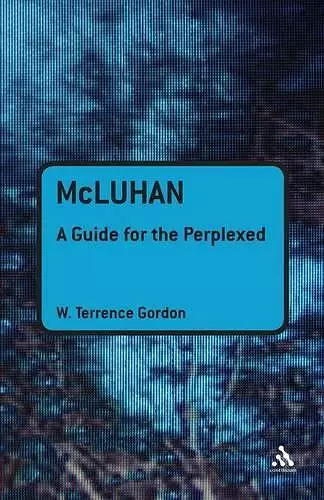McLuhan: A Guide for the Perplexed
Format:Paperback
Publisher:Continuum Publishing Corporation
Published:25th Apr '10
Currently unavailable, and unfortunately no date known when it will be back

McLuhan: A Guide for the Perplexed is a close reading of all of his work with a focus on tracing the systematic development of his thought.The overriding objective is to clarify all of McLuhan's thinking, to consolidate it in a fashion which prevents misreadings, and to open the way to advancing his own program: ensuring that the world does not sleepwalk into the twenty-first century with nineteenth-century perceptions.
Focusing on McLuhan's work, this title traces the systematic development of his thought. It intends to clarify McLuhan's thinking, to consolidate it in a fashion which prevents misreadings, and to open the way to advancing his own program: ensuring that the world does not sleepwalk into the twenty-first century with nineteenth-century perceptions."McLuhan: A Guide for the Perplexed" is a close reading of all of his work with a focus on tracing the systematic development of his thought. The overriding objective is to clarify all of McLuhan's thinking, to consolidate it in a fashion which prevents misreadings, and to open the way to advancing his own program: ensuring that the world does not sleepwalk into the twenty-first century with nineteenth-century perceptions. Marshall McLuhan was dubbed a media guru when he came to prominence in the 1960s. The Woodstock generation found him cool; their parents found him perplexing. Today he is often referred to as a media ecologist, a phrase that would have pleased him for its resonance with James Joyce's Echoland. Joyce's kaleidoscopic verbal creativity stimulated McLuhan's vision for a unified explanation of everything from Woodstock to Wall Street, from woodcuts to weapons, in terms of media and their effects. During his career, he found time to write about high literature (Chesterton, Wyndham Lewis, Pound, and Joyce) and popular culture (movies, comics, and advertising), managing even to explore the link between them in reviewing the work of his arch-rival Northrop Frye ("Inside Blake" and "Hollywood"). By 1963 McLuhan was Director of the Centre for Culture and Technology at the University of Toronto and would be a public intellectual on the international stage for more than a decade, then linked forever to his two best known coinages: the global village and the medium is the message. Both phrases express a paradox. We easily interpret the first as an image for our planet dramatically shrunken by the powerful media of instant communication. Broadband buzz and G3 gossip. For this we scarcely need McLuhan. But the medium is the message has an unsettling counter-intuitive quality that provoked critical commentaries - many of startling irrelevance to McLuhan's thrust and purpose. Legions of bewildered students and intimidated faculty may have kept silent, and McLuhan's many interviewers often merely registered irritation, but...
For anyone who is serious about understanding the origins of contemporary media theory, one must understand the origins of the original media theorist, Marshall McLuhan. Gordon's new book provides a unique insight into what made McLuhan think, and think in the way that took the world of the 1960s and subsequent by maelstrom. -- Mark Federman, Researcher at OISE, University of Toronto, and Former Chief Strategist, McLuhan Program in Culture and Technology, University of Toronto
Marshall McLuhan (1911-80) was a complex and sometimes confusing thinker. He certainly deserves a ‘guide for the perplexed', and W. Terrence Gordon attempts to provide one.—Journal of Media and Cultural Politics
ISBN: 9781441143808
Dimensions: unknown
Weight: unknown
216 pages